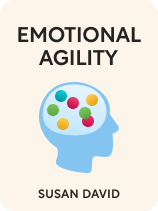

This article is an excerpt from the Shortform book guide to "Emotional Agility" by Susan David. Shortform has the world's best summaries and analyses of books you should be reading.
Like this article? Sign up for a free trial here.
Are your values based on the truth? Are they truly your own, or have they been imposed on you?
Susan David advocates cultivating the skill of emotional agility, and she outlines four steps you can take to get there. The last step is to choose your values. It starts with figuring out whether your current values are based on reality and whether they’re truly your own, and it culminates in envisioning your future.
Read more to discover how to determine your values with David’s process.
How to Determine Your Values
Values are the guiding principles that shape your behaviors and decisions, the things in life that you believe are most important. David, a clinical psychologist, explains that everyone has values whether they realize it or not. Though, for most people, many of these values are intrinsically tied to unconscious narratives.
For example, your extended family might consider “family” a core value—and look down on you for cutting an abusive parent out of your life. You might then feel tempted to believe the narrative that you must always remain in contact with your family, no matter what.
David’s advice on how to determine your values starts with a recommendation to contemplate the values others impose on you. Examine your behavior across different settings in your life. Do you act or speak differently around friends, family, and others? If so, why? Does this arise from a desire to appease or impress others who value certain behaviors more than you do?
(Shortform note: In 101 Essays That Will Change The Way You Think, author Brianna Wiest suggests that the compulsion to adopt others’ values as your own comes from the need for external validation. Early in life, you likely created a narrative that conforming to the expectations of others was the only way you could experience comfort and happiness: If you acted according to their desires and expectations, you were rewarded—for example, with extra attention and affection. On the other hand, if you acted against their desires and expectations, you were punished—for example, with rejection or social humiliation.)
Choose and Pursue Your Personal Values
David says that, besides the values you receive from others, you also carry a set of personal, unique values that, when pursued, will give you a sense of fulfillment and purpose. When you objectively understand your emotions, you don’t instinctively believe what your narratives and emotions say you should value. You’re free to purposely determine—and live by—your personal values.
David gives advice on how to determine your values: Ask yourself what life you’d pursue if you had no obstacles or stress standing in your way. When you go to bed each night, think over your day and decide what parts of it were valuable and which didn’t feel fulfilling. Imagine what your future self might think of your current values—and where those values will lead you in the future.
(Shortform note: It can be intimidating to consider every aspect of your life to determine what you value within it. In Designing Your Life, Bill Burnett and Dave Evans suggest an exercise to guide your thoughts. Think of your values in terms of four categories: health (mental, physical, and spiritual), work (both paid and unpaid), joy (what makes you happy and relaxed), and interpersonal relationships. Contemplate how satisfied you feel in each category. If you don’t feel satisfied in a category, think about what would improve your satisfaction—this will highlight where your current value set may be falling short.)
| Choose Value-Based Goals Once you have your values in mind, how do you set goals that honor your values and make them a more central part of your life? Simon Sinek’s Start With Why offers a way to set value-based goals. He explains that truly great companies start with a “why”—values that inspire you and give you a feeling of purpose—instead of starting with a “what,” or their products and services. Though Sinek wrote this book to help companies make values-based goals, you can adapt his principles to choosing personal goals as well. Let’s explore how. Once you’ve determined your personal values, decide the actions you’re willing to take to pursue your values—and note actions you’re not willing to take, or actions that contradict your values. For example, if you value “family,” consider what you’re willing to do to honor this value. Would you be willing to adjust your work schedule to attend a child’s extracurricular activities? Are there some actions you won’t take because they’ll harm one value, even if they serve another? Then, choose your goals based on these reflections. Sinek suggests turning a value into a concrete action: The value “family” might become, “Eat dinner with my family every weeknight.” |

———End of Preview———
Like what you just read? Read the rest of the world's best book summary and analysis of Susan David's "Emotional Agility" at Shortform.
Here's what you'll find in our full Emotional Agility summary:
- Why most people react instinctively rather than objectively
- How to live according to your values to create the life you want
- How to handle your emotions better using mindfulness techniques






